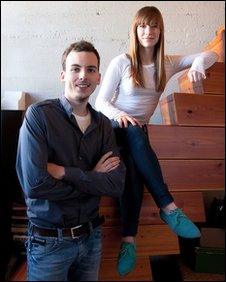Cash-strapped entrepreneurs get creative
- Published

The Lumi Co founders offered investors gifts from their range
Got a great business idea but no money to finance it? It's the age old problem faced by would-be entrepreneurs. But a new generation of online funding platforms is taking the pain out of raising capital to get new ventures off the ground.
The platforms cater for everyone from starving artists to tech start-ups. They allow anyone with a business proposition to post an online pitch which goes straight into the offices and homes of potential investors and donors across the world.
When Los Angeles-based design students Jesse Genet, 22, and Stephan Angoulvant, 24, needed to raise $12,000 (£8,000) to launch Lumi Co, a printing and design company, they decided to bypass traditional avenues and cut out the middle men.
They registered with Kickstarter.com, a site aimed at anyone in the creative industries.
"Kickstarter seemed like a really good match for our product. It allows anyone with a creative dream to make it a reality," says Angoulvant.
Rewards system
The creators of every project must set a cash goal and a time limit, though there is no limit on how much people can raise. If they reach the goal within the time limit they get to keep the pledges. If they don't, all pledges are returned.
Kickstarter takes 5% commission on all projects which are successfully funded.
Crucially, the owners of all businesses and projects funded through the site keep 100% ownership of their ventures.
The incentive for backers is both altruistic and actual. "Everyone must offer a system of rewards," says Kickstarter co-founder Perry Chen. "It's not about philanthropy or charity. It's about patronage and commerce."
Genet and Angoulvant surpassed their fundraising goal, securing $13,598 from people who pledged anything from $1 to over $1,000. As an incentive they offered backers gifts from their range including wallets and bags.
The feedback the young entrepreneurs received from would-be investors enabled them to refine their products and gave them lots of ideas for their business going forward. It also provided them with a ready made group of potential customers.
The 650 projects which have so far succeeded in meeting their funding goals through Kickstarter include a woman who is circumnavigating the globe solo by boat, a band recording their first CD and a cartoonist travelling to Afghanistan to do political sketches.
Since Kickstarter was launched by five friends in April 2009, pledges have come in from 70,000 people around the world.
Connecting people
Feedthemuse.net is the brainchild of a group of Philadelphia-based music industry professionals. It is popular among musicians and other creatives who accept pledges from as little as $1. The majority of pledges to fund new CDs and tours have come from friends, families and fans.
Taking a more traditional investor/entrepreneur approach is Grow VC. Founded in February by Jouko Ahvenainen and Valto Loikkanen, Grow VC bills itself as the first global crowdfunding tool for web and mobile start-ups. Through the site, start-ups can secure initial funding ranging from $10,000 to $1m.
The site has 2,500 registered users in 108 countries worldwide. Some 25% of Grow VC users are in the US, 11% in the UK and 7% in India.
"From the start we knew we wanted to make it very international so that investors and start-ups around the world could connect with each other," says Ahvenainen.
The total capital raised through the site so far is $12.8m.
Entrepreneurs using Grow VC include Eric Cheng, the chief executive of Hong Kong gaming company Emagist.
"Venture capitalists here are looking for big companies," says Cheng. "Grow VC appealed to us because it is very international and it is for small companies."

Petra Soderling invests $20 a month through Grow VC
Within a few months, Emagist outgrew the site. But through Grow VC it made contact with venture capitalists in Europe, the US and mainland China.
Growth potential
Along with professional investors, a growing number of ordinary people with an interest in investing have been logging on to Grow VC.
Petra Soderling heard about Grow VC on Twitter and is making the minimum Grow VC investment of $20 a month. "For me it's about investing and hoping to see a profit but also about using a small amount of money to help small companies," she says.
Not everyone is successful.
Among those who failed are New York-based Englishman Toby Daniels. His business idea, Betacup, seeks to reduce the amount of landfill in the US resulting from disposable coffee cups. Although he did not reach his funding goal, Starbucks heard about what he was trying to do on Kickstarter and offered to donate the $20,000 needed to get his plans off the ground.
"This would never have happened if we hadn't made contact with a small but engaged group on the site who got our story out there," says Daniels.
Kickstarter co-founder Perry Chen believes these new funding tools have a lot of potential for growth. "You are reaching out to your audience in a very new way which is very involving and makes them feel a strong connection," he says. "We might not be ready for Avatar 2 but the scope is huge."